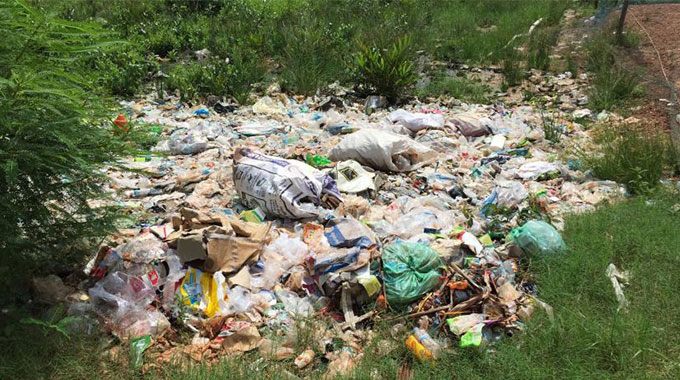Waste disposal system paramount for good health

Andile Tshuma, Health
Due to fuel shortages and other challenges, the Bulawayo City Council has been facing difficulties in refuse collection, with some suburbs going for weeks without refuse collection.
Thank goodness, the council communicates ahead of time and people have an idea of what to expect.
During times when council is facing problems with fuel supplies, it has been issuing a number of statements instructing people on what to do about their garbage. People were told to keep waste within their yards and not dispose of it by dumping it in undesignated dump sites. But such instructions often fall on deaf ears. In some suburbs, you wake up to huge piles of trash, or people just leave garbage lying on the street from the day it was supposed to have been collected. It lies there for days and dogs do justice to it, need I mention the flies, the stench and the unsightly picture of it all. I can best describe it in isiNdebele, ubutshapha/huchapa in Shona.
As an individual you might have realised, for example, that urbanisation has led to the concentration of human settlements in towns and cities where, for example, an efficient human and industrial waste disposal system has become paramount for the maintenance of good health among citizens.
As at the beginning of the 21st century, the majority of third world countries’ citizens are ignorant of their health needs regardless of the apparent importance people should attach to health issues.
It should be of great concern that people lack basic information to determine and plan appropriate action to improve their health status. Rarely do we read, view and hear the failures of local authorities to combat the ever-increasing incidences of burst sewage pipes discharging raw sewage into these towns and cities’ main water supply systems.
Yet all around us we see environmental pollution and degradation being perpetrated on a daily basis in both rural areas and urban centres.
It is particularly surprising that the general public does not exhibit any collective concern when their health is under threat. Local authorities must be put to task.
For example, the disposal of raw sewage or sludge into Harare’s main source of water, Lake Chivero, should be a great cause for concern for Harare residents. There is a strong correlation between poor health such as skin rash and itching skin with the poor treatment of water for human use and consumption.
The issue of effluent flowing into Umguza River in Matabeleland North has also been a problem for years. As residents and rate payers, we are entitled to the best service from local authorities, have a duty and social responsibility, in the face of all these adversities, to cultivate, nurture and articulate the necessary social commitment to the promotion of good health, disease surveillance and prevention. It takes a community to make things that and if every household acts, then vibrant communities are established.
Health has been a prime concern of humanity since the dawn of history. Some of the earliest written records refer to the struggle against disease and to the contrast between the factors that made for a long and healthy life and those that made life short and harsh. However, great advances in health sciences have made it possible for humankind to understand and know some of the causes of ill-health and premature deaths at different levels of society as well as how to prevent some of them.
The level of a country’s development can be measured by the state of its citizens’ health.
People need to be in good health to be productive, enjoy life and become good citizens. Yet everywhere around us, are visions of despair, misery, neglect, and haplessness.
One of our problems as residents in urban settings is that we sometimes choose to remain indifferent of things happening around us. A lot goes wrong but we all leave it to someone else to complain. We may all know that one neighbour has the habit of throwing trash on the street by the corner or dumping garbage in the trenches but we do nothing about it. Nobody dares talk to that person but after a while, that waste accumulates and before you know it, there’s an unofficial dump site and people start dumping trash there. A headache for council begins. Had that person been reported before it got out of hand, everyone would have continued enjoying living in a clean neighbourhood.
I do not understand people who feel comfortable dropping litter wherever and whenever. To be honest the Bulawayo CBD is clean, although we do have our litter hotspots especially at termini. How do you just toss a bag of chips, banana peel or your takeaway kaylite on those clean pavements? Our streets have bins at almost every corner, but you will find litter bugs just dropping wherever. It beats me.
Community leaders such as chairpersons of residents’ associations in different wards should embark on public awareness campaigns to promote good health habits or behaviour. People should know that to avoid waterborne diseases, they should uphold the highest standards of hygiene.
Nowadays, with the advent of social media, it has become easier to communicate with leaders and hold them to account. Some of the ways residents can reach out to city fathers are through using social media pages, especially Twitter, to tag their councillors, or the city council and state what problems they have in their communities.
If there’s uncollected refuse for days and there’s no explanation, take a picture, post on Twitter and tag the relevant authorities.
Authorities that care about the health of their communities will act. Do your part, dispose of your waste responsibly. – @andile_tshuma.










Comments